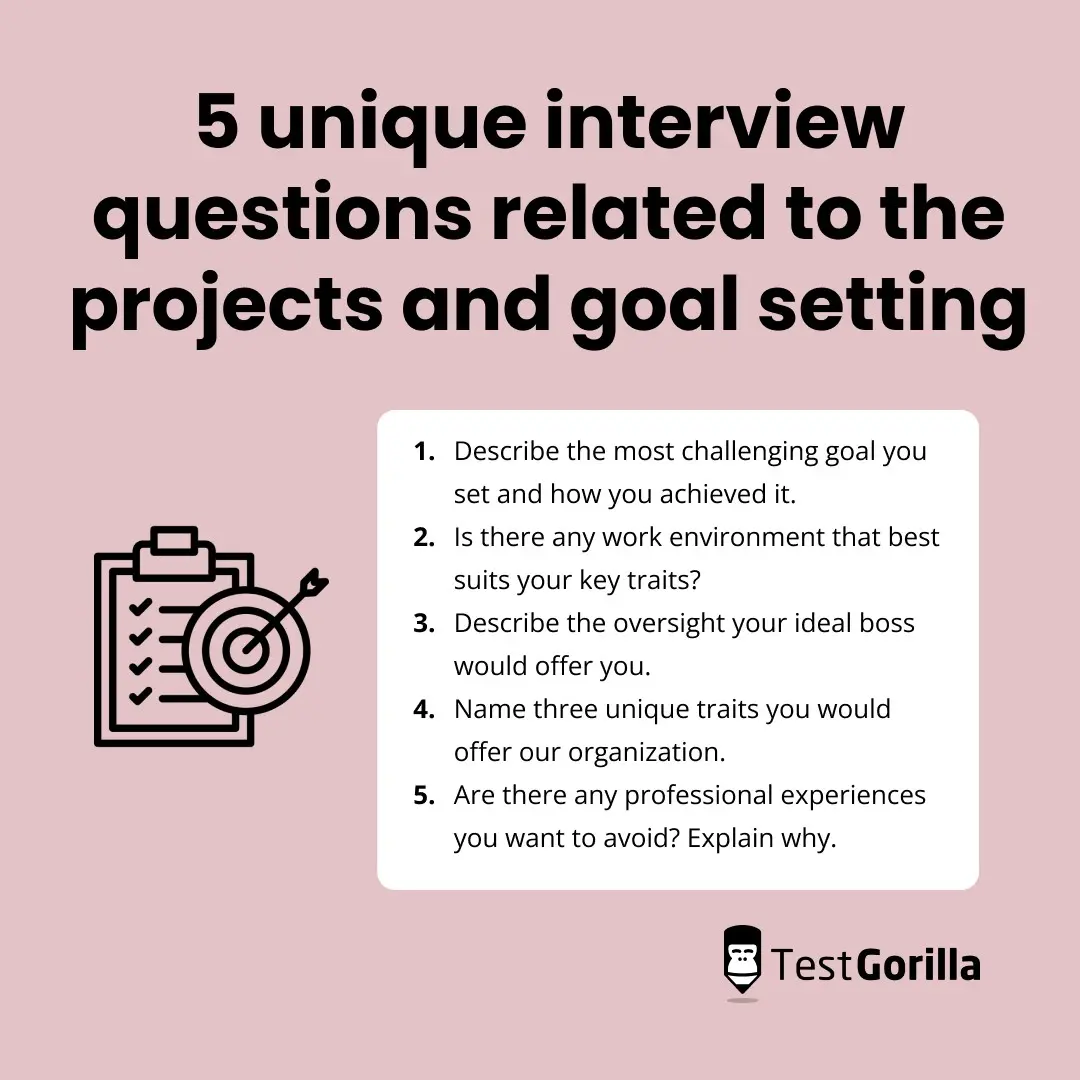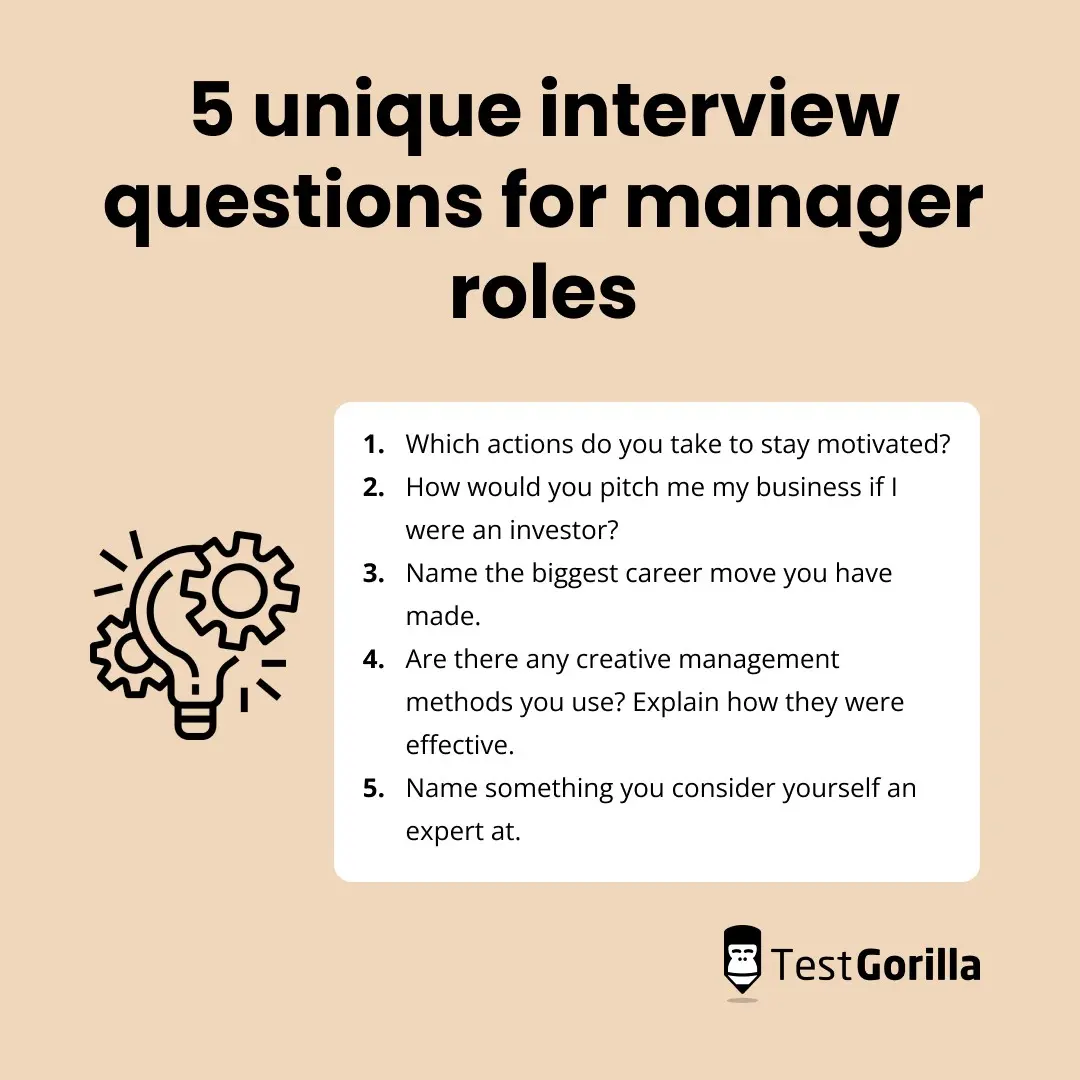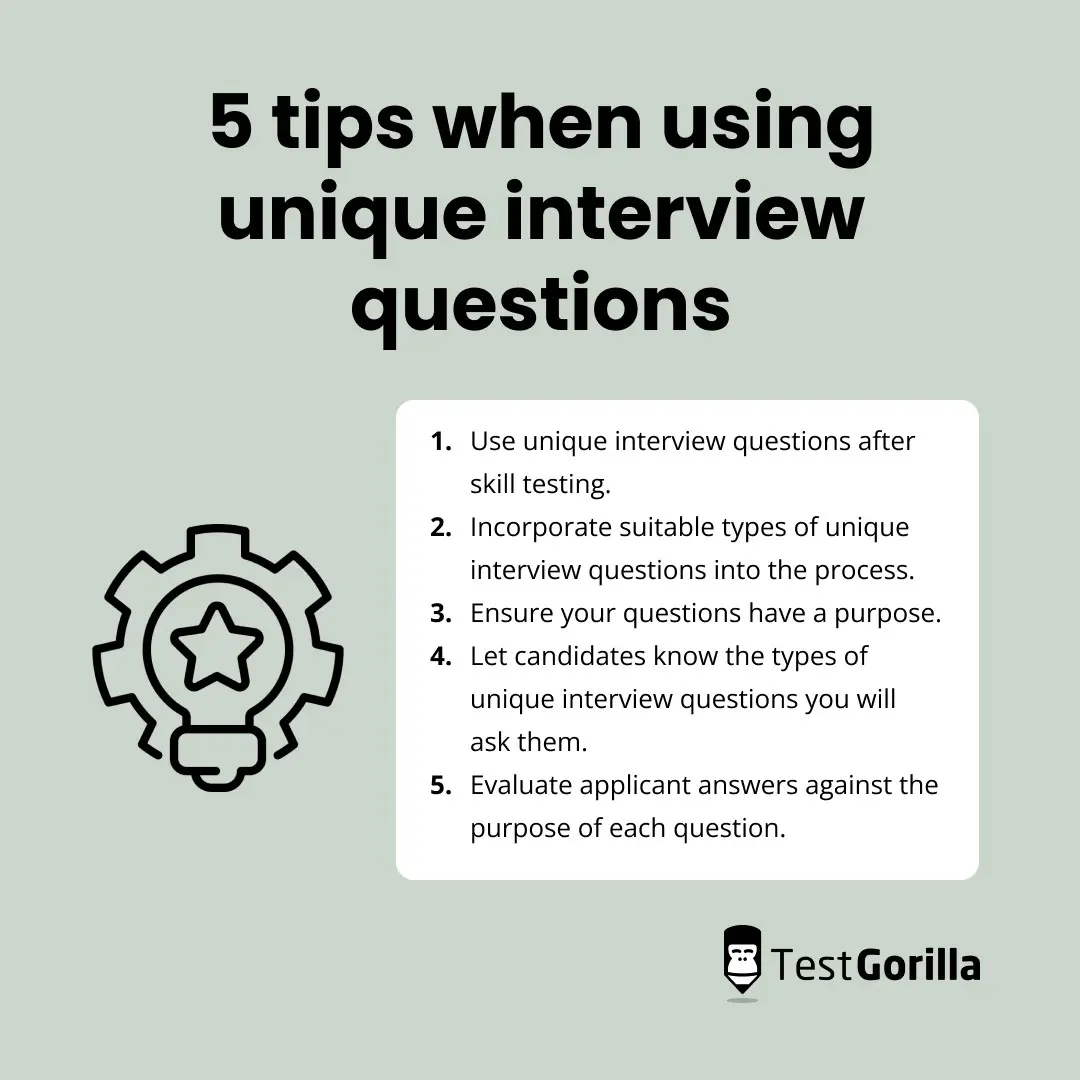After sourcing skilled applicants interested in joining your team, you need to evaluate your candidates. A couple of steps can enhance the effectiveness of the process: First, skills testing is a data-driven method that will help you target top applicants instantly and avoid long resume-screening methods.
You should always follow a skills assessment with the second step: interviews. And to keep your interviews engaging, you need to ask unique interview questions. This helps you build a rapport with your candidates and learn about their personalities.
Have you reached the stage where you need to build a list of interview questions? Our ultimate unique interview questions are below – take a look to start the process.
Table of contents
- 15 unique interview questions to break the ice and reveal your company culture
- 5 unique interview questions and answers to use as dialogue openers
- 8 unique interview questions and sample answers with a creative edge
- 5 unique interview questions and answers related to the projects and goal setting
- 12 unique interview questions for management roles
- 5 unique interview questions for manager roles and sample answers
- 5 tips when using unique interview questions
- Assess experts for your team using unique interview questions and skill tests
15 unique interview questions to break the ice and reveal your company culture
Icebreaker unique interview questions will help you learn about candidates right at the beginning of the interview. Ask them a selection of these 15 questions to discover something new about them instantly.
What is your favorite animal and why?
Which fictional character would you aspire to emulate?
How would you describe this field to a college-level student?
What two items would you take to a deserted island?
Where would you go if you could travel to any destination on Earth?
Would you like to learn a new language?
What approach do you take to work hard and play hard?
Which factors inspired you to join this field?
What gift would someone buy you if they knew you well?
What gift would you buy someone else?
Is socializing a part of your working day? Why or why not?
Have you ever felt like a superhero at work?
Describe a time a past organization didn’t fit your personality.
How do you feel your values would align with our values and mission?
Talk about your favorite company event. What made it unique and why did you enjoy it?
5 unique interview questions and answers to use as dialogue openers
Here are five important unique interview questions to start the dialogue and the elements of good answers to guide you when reviewing your candidates’ responses.
1. How do you feel your values would align with our values and mission?
Although you can always give applicants a Culture Add test to examine whether a candidate’s values align with your organization’s values, this unique interview question will help you dig deeper.
70.5% of candidates research companies before applying, and the best answers will show that applicants have reviewed your company’s mission before the interview and will include several positive values. For instance, if your company values include transparency and honesty, ensure the candidate you choose is honest and open.
2. How would you describe this field to a college-level student?
Knowing whether your applicants are familiar with the field they work in is essential. It indicates their level of experience and competency and helps you learn if their familiarity matches your expectations. You can learn about your candidates’ experience by asking this unique interview question.
Experienced candidates may mention the skills the field requires and the responsibilities that workers handle. Of course, each response will depend on the specific field your open role belongs to.
If you’re hiring a content writer, they may mention that SEO copywriting skills are important and describe a few responsibilities of this role, such as:
Keyword research
Writing blogs and articles
Inserting internal and external links
Proofreading drafts
3. Which factors inspired you to join this field?
Understanding the key motivators that inspired applicants to join the field can help you gauge their commitment to progress.
Listen for responses indicating that the candidate’s motivation, skills, and curiosity align with your expectations. For example, if hiring a software developer, consider whether your applicants enjoyed using their software programming knowledge at a young age or are constantly determined to perfect their programming skills via side projects.
Even if you start with a Software skills test to assess these candidates, it’s always handy to ask follow-up questions about their motivation.
4. Describe a time a past organization didn’t fit your personality.
Although you may use Enneagram tests to explore how the team dynamic may change if the candidate were to join, understanding more about the organizations and teams that don’t align with the candidate’s personality is worthwhile. This unique interview question can reveal what the candidate is looking for in their next role.
Applicants may explain that they adapted to an organization’s work environment. They might mention some factors that motivate them in an ideal role.
5. Is socializing a part of your working day? Why or why not?
This question is an adaptation of the frequently asked, “Do you prefer working as an individual or as part of a team?” It is crucial because understanding whether your candidates’ collaboration extends to social events may help you learn more about team dynamics.
Socializing can enhance productivity, and candidates may mention that they enjoy interacting with team members. But listen out for responses that indicate they can balance socializing at work with their workplace duties.
8 unique interview questions and sample answers with a creative edge
Consider asking applicants these eight creative and unique interview questions and check the sample answers to assess your applicants’ responses.
1. What would your ideal day look like?
This question is ideal for learning if your applicants’ values align with your organization. It will also help you determine which interests and priorities are most important to your candidates.
Applicants may describe a combination of hobbies and work when answering. For example, some applicants may enjoy cycling before work or walking. Others may enjoy keeping busy at work and interacting with clients.
2. What actions would you take if you won a life-changing sum of money?
With this question, you can learn more about your applicants’ priorities and enthusiasm for their field. While many individuals may consider quitting their day job if they win a sum, those passionate about their profession may indicate they would keep working in the same field.
3. What is your best trait or feature?
85% of employers consider work ethic an important trait in employees, but many other features are important. When responding to this unique interview question, candidates may mention soft skills, personality traits, or hard skills.
For instance, a software developer may emphasize their attention to detail when coding or debugging an application. A content writer may explain that their best trait is curiosity and research ability.
Consider whether their best trait or feature aligns with the work they will do for your organization or will make their work easier to complete.
4. How would your current boss describe your work quality?
Since constant improvement is crucial for candidates in many fields, applicants should respond to this question by noting that they’re receptive to feedback.
Potential red flags include responses that criticize former supervisors, indicate they’re not interested in improvement, or suggest that they regularly sacrifice deadlines for absolute perfection.
You can also review the accuracy of your candidates’ responses after the interview stage by completing reference checks and speaking with each candidate’s current boss.
5. Which hard skill would your co-workers say is your biggest superpower?
This unique interview question is a modified version of “Describe your biggest strength.” Asking this question will help you learn what your applicants consider to be their biggest professional asset.
Answers may vary depending on your applicant’s field of work. For instance, a receptionist may explain that their co-workers consider their customer-service skills a superpower. A salesperson may mention that their superpower is B2B sales.
Always listen for responses that explain why your applicants value such skills. Top responses may include examples of how they handled complex situations using their best skills.
6. If you could hone one skill in less than 15 minutes, what skill would that be?
Responses to this interview question may vary. From learning a new language (coding or spoken) to learning how to surf to perfecting musical talents, there are many skills your applicants could consider valuable.
This question might reveal whether your applicants have any hidden talents or traits, such as creativity, perseverance, or artistic expertise. It may also help you get to know your applicants and discover their interests outside of work.
7. Which 3 adjectives would your best friend use to describe you?
You may receive many responses to this unique interview question but listen for positive adjectives that align with your organization’s values. For instance, if one of your core values is commitment, candidates that respond to the question by mentioning determination may be valuable.
8. Describe your favorite hobby in three sentences.
Candidates may describe a range of hobbies but look for concise answers. By asking candidates to respond using three sentences, you can test their communication skills and ability to clearly explain their hobbies and why they enjoy these activities.
5 unique interview questions and answers related to the projects and goal setting
Incorporate these seven unique interview questions into the interview process and look out for the components of good answers when reviewing your candidates’ responses.
1. Describe the most challenging goal you set (work-related or otherwise) and how you achieved it.
Since your open role will likely confront your candidates with challenging goals, consider their approaches to such challenges. The key to assessing their responses is assessing their effort and work ethic for complex challenges. Listen out for responses that show your candidates can overcome adversity and note the methods they use.
Even though only 44% of employees update their goals as they take on new responsibilities, they must prepare themselves to achieve extra duties in the workplace.
Therefore, consider whether they aim to access tools and advice or choose to upskill when facing challenging goals, and reflect on their resourcefulness, determination, and problem-solving abilities.
2. Is there any work environment that best suits your key traits?
Responses to this question will indicate which work environment inspires candidates to be productive. When reviewing answers, check whether your applicants’ preferred work environment matches the one you will offer them after hiring and onboarding.
3. Describe the oversight your ideal boss would offer you.
Is your applicant a self-directed, individual worker or do they require extra support when completing projects? By asking this interview question, you can determine the level of autonomy your applicants prefer and shortlist suitable candidates.
4. Name three unique traits you would offer our organization.
From staying level-headed to being approachable and using initiative, there are plenty of traits your candidates may offer your organization. Applicants may mention unique characteristics, such as being creative or speaking candidly.
Ensure the traits align with your organization or help your business’s team achieve its goals.
5. Are there any professional experiences you want to avoid? Explain why.
While some candidates will be comfortable expanding their skills and experiences and trying something new, others may be more selective about the professional experiences they embrace. If applicants are keen to learn a new skill, they may mention that training opportunities are the ideal approach to improve.
12 unique interview questions for management roles
Here are 12 unique interview questions ideal for management roles. Ask applicants these questions to learn what makes candidates unique as managers and how they handle management situations.
If you had $200,000 to create a business, what business would you launch?
Name the most significant career move you have made.
If you had to create a press release for our business, what title would you give it?
How would you pitch me my business if I were an investor?
Describe a time you were able to avoid taking a situation too seriously.
Name something you consider yourself an expert at.
How would you sell yourself? What motto would you use?
What factors have previously stopped you from achieving a goal?
Describe the five-year plan you would initiate if you were our chief executive.
Which actions do you take to stay motivated?
Which traits do you look for in your team members?
Are there any creative management methods you use? Explain how they were effective.
5 unique interview questions for manager roles and sample answers
Check these five unique interview questions for manager roles and the sample answers before examining your candidates’ responses.
1. Which actions do you take to stay motivated?
Although you can check your candidates’ motivation using a Motivation test, this question will help you learn whether the factors that motivate your candidates align with your organization’s culture. Candidates may stay motivated by collaborating with team members, achieving deadlines, or setting targets.
2. How would you pitch me my business if I were an investor?
Asking this question will determine two things: You will learn if your candidates have the persuasive skills to sell your business and find out if they have researched your company. If your candidates fully understand what your business does, they should have no problem pitching it to you.
This question is particularly handy if you are hiring a salesperson for your team – it helps you test your candidates’ negotiation, communication, and sales skills.
3. Name the biggest career move you have made.
Whether your candidates take on extra responsibility or accept a related but slightly different role, upward progression in their career is important. Consider applicants who have achieved impressive outcomes and can use their skills to add similar value to your organization.
For instance, if a software engineer makes a significant career move and becomes an engineering manager, consider the transferrable management skills the candidate can bring to your role if you hire them.
4. Are there any creative management methods you use? Explain how they were effective.
Creative incentives, mitigating micromanagement, and giving teams extra freedom are just a few management methods that can help improve workflows when overseeing a team. Candidates may explain that they used innovative incentives to enhance their team’s passion and motivation.
The best answers will describe the outcomes of the creative management methods. Perhaps the team’s productivity increased by a certain percentage or they were more motivated than before.
5. Name something you consider yourself an expert at.
The secret to reviewing your candidates’ responses to this unique interview question is to consider whether the candidate can teach you about their area of expertise. If they can do this, your applicant may make a good mentor, manager, or team leader.
Whichever task, action, or hobby your candidate considers themselves proficient in, ensure they can explain how to achieve it. The top answers will be easy to understand and guide you through the task or action.
5 tips when using unique interview questions
Before incorporating these unique interview questions into your hiring process, consider these five tips for effective interviewing.
1. Use unique interview questions after skill testing
The first tip is to use a skills-testing method before proceeding with the interview process. This method involves three steps: selecting a top skill testing platform (such as TestGorilla), creating your skills assessment by choosing five tests, and sending invitations to applicants. This approach will make your shortlisting process efficient, quick, and data-driven.
You also gain additional time and a more objective hiring method by completing the hiring process in this order. By selecting skills testing over resume screening and dedicating a short time to prepare an assessment, you prioritize objective evaluations over scanning for keywords in a resume and potentially losing a skilled candidate.
2. Incorporate suitable types of unique interview questions into the process
Different categories of unique interview questions are ideal for different roles and experience levels. For instance, you might select some questions from our leadership section if hiring a manager. Or, if you’re just beginning the interview, you might use icebreaker interview questions.
Selecting the wrong types of unique interview questions may affect the candidate’s experience and the company brand. For these reasons, ensure you incorporate suitable unique interview questions into the hiring process.
3. Ensure your questions have a purpose
When asking unique interview questions, ensuring all questions have a purpose is critical. Whether your aim is to learn about your applicants’ professional interests or to get acquainted with them, each question should help you learn something or achieve a goal as an interviewer.
Never ask unique interview questions that lack a purpose. Not only does this method hinder the candidate experience, but you also won’t gain any meaningful data you can use to evaluate your applicants.
4. Let candidates know the types of unique interview questions you will ask them
You may use different types of unique interview questions, such as those related to projects or that help introduce candidates, but inform your applicants of the types of questions you will ask them.
For example, if you transition from introductory unique interview questions to goal-setting questions, tell your candidates, so they can prepare. This method will help you receive the ideal answers that reflect your candidates’ suitability for the role.
5. Evaluate applicant answers against the purpose of each question
After the interview, you can evaluate your applicants’ answers against the purpose of each question. For instance, if you hope to learn whether your candidate’s values align with your organization, you can ask an appropriate unique interview question and compare your business’s values with your applicant’s responses.
Assess experts for your team using unique interview questions and skill tests
The best way to learn more about applicants is with unique interview questions and skills tests. Remember, unique interview questions will help you discover new things about your candidates’ personalities and experiences, building on what you find out from their skills assessment results.
For more information about skills testing, visit TestGorilla, check our library of tests, or submit a request for a live demo.
Related posts
Hire the best candidates with TestGorilla
Create pre-employment assessments in minutes to screen candidates, save time, and hire the best talent.
Latest posts
The best advice in pre-employment testing, in your inbox.
No spam. Unsubscribe at any time.

Hire the best. No bias. No stress.
Our screening tests identify the best candidates and make your hiring decisions faster, easier, and bias-free.
Free resources
This checklist covers key features you should look for when choosing a skills testing platform
This resource will help you develop an onboarding checklist for new hires.
How to assess your candidates' attention to detail.
Learn how to get human resources certified through HRCI or SHRM.
Learn how you can improve the level of talent at your company.
Learn how CapitalT reduced hiring bias with online skills assessments.
Learn how to make the resume process more efficient and more effective.
Improve your hiring strategy with these 7 critical recruitment metrics.
Learn how Sukhi decreased time spent reviewing resumes by 83%!
Hire more efficiently with these hacks that 99% of recruiters aren't using.
Make a business case for diversity and inclusion initiatives with this data.




















